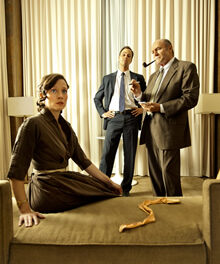Playwright Tom Stoppard’s The Real Thing was first produced in 1982, just prior to his landmark Arcadia. It was written, perhaps, to silence his critics who called him “clever” and “witty” but also “cold,” “unemotional,” and “crafty.” Stoppard addresses both aspects in this play about theater, love, fidelity, and anarchy. The play is currently running at Raleigh’s Theatre in the Park.
Henry (Paul Paliyenko, Way to Heaven, Closet Land) is a comic playwright who is married to an actress, Charlotte (Sandi Sullivan, The Prime of Miss Jean Brodie). She has just finished performing the romantic lead in one of his plays, House of Cards. Playing opposite her was Max (Larry Evans, Oleanna, Lost in Yonkers), who is also married to an actress, Annie (Page Purgar, Uncle Vanya, Anarchist!). Here’s the rub: Henry and Annie are having an affair, a quite serious one, it seems; in short order both Henry and Annie have left their spouses and moved in together. Annie continues with a cause she upholds, the release of Brodie (Rob Rainbolt, Afric’s Muse, Romeo and Juliet), an anarchist who has written a play. She tries to get Henry to read the play but, rightly so, Henry discovers that Brodie can’t write. He tells her as much. She begs him to please take on the play and make it presentable. Meanwhile, she is cast in a Glasgow production of Pity She’s a Whore and is off to rehearse, leaving Henry to his work.
Henry goes to visit Charlotte and see his daughter, Debbie (Sarah Bousquet, And the Winner Is, Veronica’s Room), a young student of 17 who has reached the age of Cynicism. Henry tries to tell her that not everything is jaded, and to try to mix her skepticism with a little feeling. Henry is prone to “go on,” and does so several times in the play, about writing, love, and pain. These things are all on his mind, because he is trying to whip Brodie’s play into shape, he misses his love, and he discovers that she is being unfaithful with another actor in Glasgow. He learns that it causes him heartfelt pain, something new to him and, it seems, Stoppard himself.
Director Jesse R. Gephart gathers a septet of players who handle the volatility of the play well; Paliyenko does passingly well with his “speeches” and both his wives know to take them with a very large grain of salt. Evans plays his scenes as an impassioned thespian with relish; Rainbolt is trademark in his disrespect for everything; and Bousquet retains enough youthful joy to offset her cynicism. But the play doesn’t seem finished. Technically, the show is a bear, and the constant shifting of scenes thoroughly distracts from and breaks up the play – at one point, stopping it completely when a set piece decided to freeze in its tracks in act II. But more than that, there is a lack of depth in all these characters. At times Henry seems almost flip in his dismissals; his love Annie seems not to feel any remorse at all in her infidelity, even though it causes Henry pain; the whole play seems to be off a beat, as if the players are attempting to correct for something, constantly. There are depths to this play that are not at all plumbed; it is the closest thing to an autobiographical play that Stoppard comes, and this aspect of the work seems given only a glance, if actually addressed at all. Henry speeds through his “speeches” so that many of those he addresses seem not to hear him at all, and this is a major flaw. It is Henry’s speeches that define him, and we as well as his onstage listeners need to listen up.
The problem here seems to be that the subtexts of the play are being ignored. Henry’s battles are not just with himself; he must do battle with his critics and his producers and those for whom he writes. His ladies seem not to take him seriously at all. And there was a point in the play where the audience was completely nonplussed because the actors all headed onstage, and it did not seem like the show had actually concluded. All these aspects of the show indicate that the show is, indeed, not finished; that a few more nights must go by before the cast – and crew – feels comfortable in their skins. Stoppard is a playwright who is taken on by professional houses at their peril; that he should be attempted by an amateur company is laudatory, but the play must be examined in all its complexity if it is to be successful.
This play continues through February 20. For details, see the sidebar.











